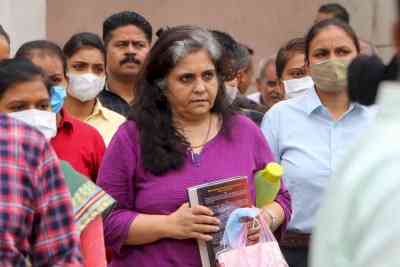Gujarat riots: SC grants interim bail to Teesta Setalvad, asks her to surrender passport
A day after expressing concern at delay by Gujarat High Court on hearing activist Teesta Setalvad's bail plea, the Supreme Court on Friday granted her interim bail.

New Delhi, Sep 2 (IANS) A day after expressing concern at delay by Gujarat High Court on hearing activist Teesta Setalvad's bail plea, the Supreme Court on Friday granted her interim bail.
Setalvad was arrested for allegedly fabricating documents to frame high-ranking officials, including then Gujarat Chief Minister Narendra Modi, in the 2002 riots cases in the state, and was in custody since June 25.
A bench, headed by Chief Justice U.U. Lalit and comprising Justices S. Ravindra Bhat and Sudhanshu Dhulia, said that since the essential custodial interrogation is complete, the matter of interim bail should have been heard, and noted that her bail plea is still pending before the Gujarat High Court.
"We grant Teesta Setalvad interim bail," the bench said.
It also directed Setalvad to surrender her passport in the trial court and made it clear that the high court will decide her regular bail plea without being influenced by its order.
The top court directed that she be produced on Saturday before the concerned trial court which shall release her on bail, subject to conditions that it may impose.
During the hearing, senior advocate Kapil Sibal, representing Setalvad, submitted that authorities concerned are deeply interested that his client never comes out on bail. "I am the state's number 1 enemy," said Sibal.
Solicitor General Tushar Mehta, representing the Gujarat government, opposed Sibal's submissions and argued that Setalvad was capable of influencing the witnesses in the case.
At this, Sibal replied: "How can she be more powerful than the state...", and emphasised that facts narrated in the FIR against his client are nothing but repetition of proceedings which ended with apex court's judgment on June 24, and the no offence was made out against her.
Mehta urged the apex court not to set a "very bad precedent" by giving extraordinary treatment to Setalvad, when the high court is already seized of the case.
After hearing detailed arguments, the top court said the applicant, "a lady", has been in custody since June 25 and the offences alleged against her pertain to 2002, and also documents cited were till 2012 . It added that the investigating machinery has had the advantage of custodial interrogation of 7 days and after that she was sent to judicial custody.
"Having considered the circumstances on record, in our view, the high court ought to have considered the prayer for release on interim bail during the pendency of the matter," noted the bench. It further added that relief of interim bail should have been granted, till the matter was considered by the high court.
The top court asked the high court to decide her bail plea, but in the meantime Setalvad will be out on interim bail. She had moved the apex court after the Gujarat High Court made a long adjournment on her bail plea while not passing any order of interim bail.
Taking into consideration the pendency of her bail plea before the high court, the bench said: "We are not therefore considering whether the appellant is released on bail or not. That issue will certainly be gone into by the high court..."
Concluding the hearing in the matter , the bench said: "Having bestowed our attention to all the relevant aspects of the mattera..the appellant is entitled to the relief of interim bail."
On a request made by Additional Solicitor General S.V. Raju, the top court also said other co-accused in the case shall not take advantage of the relief granted to Setalvad.
"It is further made clear that the relief of interim bail is granted to the appellant in the peculiar facts, including the fact that she happens to be a lady," it said.
On Thursday, the top court told Mehta that the high court had issued notice on August 3 on her bail plea and granted a long adjournment, making the notice returnable by 6 weeks, and asked to give cases where a woman has been confined on charges like these and the time given by the high court is 6 weeks.
The bench had queried: "Are you making an exception in case of this lady... how could HC make notice returnable by 6 weeks. Is that the standard practice in the high court?"
"These are not offences like murder or bodily injury but based on documents like forgery etc. In these matters the normal idea is after normal police custody is over, there is nothing for the police to insist on custody...". The Chief Justice further queried that the FIR is nothing more of what happened in the top court, is there any additional material apart from the apex court judgment?
On June 24, the Supreme Court dismissed the appeal filed by Zakia Jafri, wife of Congress leader Ehsan Jafri who was killed during the violence at Ahmedabad's Gulberg Society in 2002, challenging the SIT's clean chit to the then Gujarat Chief Minister Narendra Modi and others during the riots in the state.
A bench headed by Justice A.M. Khanwilkar (now retired) said that the present proceedings have been pursued for last 16 years, "including with the audacity to question the integrity of every functionary involved in the process of exposing the devious stratagem adopted".
"To keep the pot boiling, obviously, for ulterior design. As a matter of fact, all those involved in such abuse of process, need to be in the dock and proceeded with in accordance with law," it had said.


 IANS
IANS 








